Document WG1N87005
JPEG Committee releases a call for evidence on point cloud coding
The 87th JPEG meeting initially planned to be held in Erlangen, Germany, was held online because of the Covid-19 outbreak. JPEG experts participated in a number of online meetings attempting to make them as effective as possible while considering participation from different time zones, ranging from Australia to California, U.S.A.
JPEG decided to proceed with a Second Call for Evidence on JPEG Pleno Point Cloud Coding and continued work to prepare for contributions to the previous Call for Evidence on Learning- based Image Coding Technologies (JPEG AI).
JPEG Pleno Point Cloud
JPEG Pleno is working towards the integration of various modalities of plenoptic content under a single and seamless framework. Efficient and powerful point cloud representation is a key feature within this vision. Point cloud data supports a wide range of applications including computer-aided manufacturing, entertainment, cultural heritage preservation, scientific research and advanced sensing and analysis. During the 87th JPEG meeting, the JPEG Committee released a Second Call for Evidence on JPEG Pleno Point Cloud Coding that focuses specifically on point cloud coding solutions supporting scalability and random access of decoded point clouds. The Second Call for Evidence on JPEG Pleno Point Cloud Coding has a revised timeline reflecting changes in the activity due to the 2020 COVID-19 Pandemic. A Final Call for Evidence on JPEG Pleno Point Cloud Coding is planned to be released in July 2020.
JPEG AI
ISO/IEC JTC 1/SC29/WG1 N87005 87th Meeting – Online – 25-30 April 2020 The main focus of JPEG AI was on the promotion and definition of the submission and evaluation methodologies of the Call for Evidence (in coordination with the IEEE MMSP 2020 Challenge) that was issued as outcome of the 86th JPEG meeting, Sydney, Australia.
JPEG XL
The File Format has been defined for JPEG XL (ISO/IEC 18181-1) codestream, metadata and extensions. The file format enables compatibility with ISOBMFF, JUMBF, XMP, Exif and other existing standards. Standardization has now reached the Committee Draft stage and the DIS ballot is ongoing. A white paper about JPEG XL’s features and tools was approved at this meeting.
JPEG exploration on Media Blockchain – Call for feedback on use cases and requirements
JPEG has determined that blockchain and distributed ledger technologies (DLT) have great potential as a technology component to address many privacy and security related challenges in digital media applications. This includes digital rights management, privacy and security, integrity verification, and authenticity, that impacts society in several ways including the loss of income in the creative sector due to piracy, the spread of fake news, or evidence tampering for fraud purposes.
JPEG is exploring standardization needs related to media blockchain to ensure seamless interoperability and integration of blockchain technology with widely accepted media standards. In this context, the JPEG Committee announces a call for feedback from interested stakeholders on the first public release of the use cases and requirements document.
JPEG Systems
Media “snacking”, the consumption of multimedia in short bursts (less than 15 minutes) has become globally popular. JPEG recognizes the need for standardizing how snack images are constructed to ensure interoperability. A first version of JPEG Snack use cases and requirements is now complete and publicly available on JPEG website inviting feedback from stakeholders.
JPEG made progress on a fundamental capability of the JPEG file structure with enhancements to JPEG Universal Metadata Box Format (JUMBF) to support embedding common file types; the DIS text for JUMBF Amendment 1 is ready for ballot. Likewise JPEG 360 Amendment 1 DIS text is ready for ballot; this amendment supports stereoscopic 360 degree images, accelerated rendering for regions-of-interest, and removes the XMP signature block from the metadata description.
JPEG XS – The JPEG committee is pleased to announce significant improvement of the quality of its upcoming Bayer compression
Over the past year, an improvement of around 2dB has been observed for the new coding tools currently being developed for image sensor compression within JPEG XS. This visually lossless low-latency and lightweight compression scheme can be used as a mezzanine codec in various markets like real-time video storage inside and outside of cameras, and data compression onboard autonomous cars. Mathematically lossless capability is also investigated and encapsulation within MXF or SMPTE ST2110-22 is currently being finalized.
"JPEG is committed to the development of new standards that provide state of the art imaging solutions to the largest spectrum of stakeholders. During the 87th meeting, held online because of the Covid-19 pandemic, JPEG progressed well with its current and even launched new activities. Although some timelines had to be revisited, overall, no disruptions of the workplan have occurred.” said Prof. Touradj Ebrahimi, the Convenor of the JPEG Committee.
About JPEG
The Joint Photographic Experts Group (JPEG) is a Working Group of ISO/IEC, the International Organisation for Standardization / International Electrotechnical Commission, (ISO/IEC JTC 1/SC 29/WG 1) and of the International Telecommunication Union (ITU-T SG16), responsible for the popular JPEG, JPEG 2000, JPEG XR, JPSearch, JPEG XT and more recently, the JPEG XS, JPEG Systems, JPEG Pleno and JPEG XL families of imaging standards.
The JPEG Committee nominally meets four times a year, in different world locations. The 86th JPEG Meeting was held on 18 to 24 January 2020, Sydney, Australia. The next 88th JPEG Meeting will be held online from 7 to 10 July 2020, because of the Covid-19 pandemic.
More information about JPEG and its work is available at jpeg.org or by contacting of the JPEG Communication Subgroup.
If you would like to stay posted on JPEG activities, please subscribe to the jpeg-news mailing list.
A zip package containing the official JPEG logo and logos of all JPEG standards can be downloaded here.
Future JPEG meetings are planned as follows:
- No 88, originally planned in Geneva, Switzerland, July 4 to 10, 2020, will be held online from July 7 to 10, 2020.
